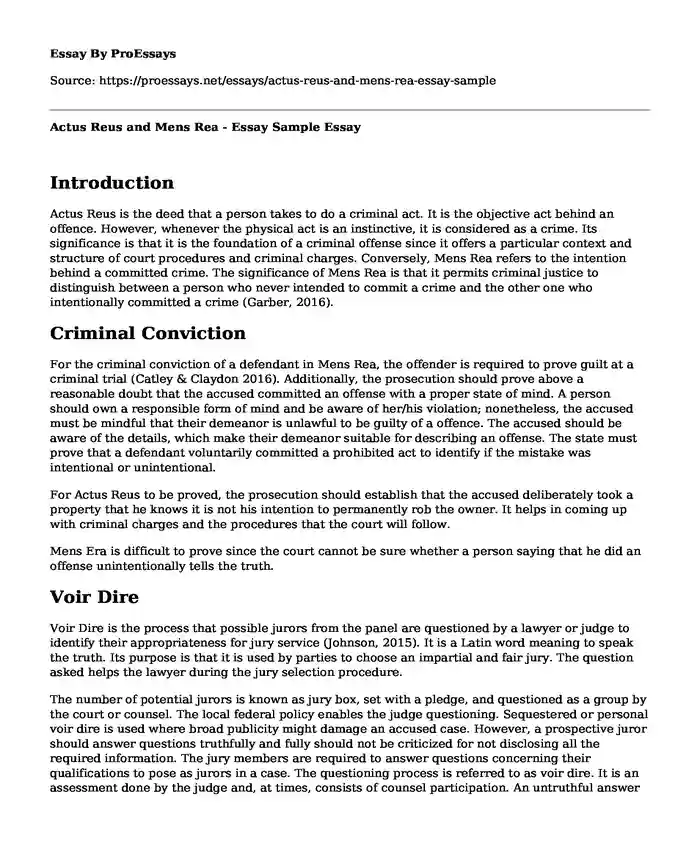Introduction
Actus Reus is the deed that a person takes to do a criminal act. It is the objective act behind an offence. However, whenever the physical act is an instinctive, it is considered as a crime. Its significance is that it is the foundation of a criminal offense since it offers a particular context and structure of court procedures and criminal charges. Conversely, Mens Rea refers to the intention behind a committed crime. The significance of Mens Rea is that it permits criminal justice to distinguish between a person who never intended to commit a crime and the other one who intentionally committed a crime (Garber, 2016).
Criminal Conviction
For the criminal conviction of a defendant in Mens Rea, the offender is required to prove guilt at a criminal trial (Catley & Claydon 2016). Additionally, the prosecution should prove above a reasonable doubt that the accused committed an offense with a proper state of mind. A person should own a responsible form of mind and be aware of her/his violation; nonetheless, the accused must be mindful that their demeanor is unlawful to be guilty of a offence. The accused should be aware of the details, which make their demeanor suitable for describing an offense. The state must prove that a defendant voluntarily committed a prohibited act to identify if the mistake was intentional or unintentional.
For Actus Reus to be proved, the prosecution should establish that the accused deliberately took a property that he knows it is not his intention to permanently rob the owner. It helps in coming up with criminal charges and the procedures that the court will follow.
Mens Era is difficult to prove since the court cannot be sure whether a person saying that he did an offense unintentionally tells the truth.
Voir Dire
Voir Dire is the process that possible jurors from the panel are questioned by a lawyer or judge to identify their appropriateness for jury service (Johnson, 2015). It is a Latin word meaning to speak the truth. Its purpose is that it is used by parties to choose an impartial and fair jury. The question asked helps the lawyer during the jury selection procedure.
The number of potential jurors is known as jury box, set with a pledge, and questioned as a group by the court or counsel. The local federal policy enables the judge questioning. Sequestered or personal voir dire is used where broad publicity might damage an accused case. However, a prospective juror should answer questions truthfully and fully should not be criticized for not disclosing all the required information. The jury members are required to answer questions concerning their qualifications to pose as jurors in a case. The questioning process is referred to as voir dire. It is an assessment done by the judge and, at times, consists of counsel participation. An untruthful answer to a fair question might lead to severe punishment to the individual answering. Peremptory challenges give extra unbiased and better-qualified jury. The challenges help the attorney to reject a possible jury for imagined or actual partiality, which can be hard to display under the dispute of course grouping (Flanagan, 2015).
Conclusion
The opinion is that the jury system was introduced in the U.S so that the community can decide a person's sentence and not the judge. Something exquisite occurs when people are grouped in a room to listen to a legal case. It is advantageous since personal bias is reduced in sentencing; however, the disadvantage is that a biased individual might hand down an unfair ruling.
References
Catley, P., & Claydon, L. (2016). The use of neuroscientific evidence in the courtroom by those accused of criminal offenses in England and Wales. Journal of Law and the Biosciences, 2(3), 510-549.
Flanagan, F. X. (2015). Peremptory challenges and jury selection. The Journal of Law and Economics, 58(2), 385-416.
Garber, T. M. H. M. E. (2016). The Elements of Crime. Dickinson Law Review, 26(8). https://2012books.lardbucket.org/pdfs/introduction-to-criminal-law/s08-the-elements-of-a-crime.pdf
Johnson, V. B. (2015). Presumed Fair-Voir Dire on the Fundamentals of Our Criminal Justice System. Seton Hall L. Rev., 45, 545.
https://scholarship.shu.edu/cgi/viewcontent.cgi?referer=&httpsredir=1&article=1535&context=shlr.
Cite this page
Actus Reus and Mens Rea - Essay Sample. (2024, Jan 01). Retrieved from https://proessays.net/essays/actus-reus-and-mens-rea-essay-sample
If you are the original author of this essay and no longer wish to have it published on the ProEssays website, please click below to request its removal:
- Research Paper on the Similarities Between Organized Crime and Terrorism
- Joshua's Case About Harassment
- Weather/Climate in South Africa - Essay Sample
- Death Penalty: Deterrent for Crime or Ineffective Measure? - Research Paper
- Essay on Privacy & Security: A Closer Look at the Rights and Protections
- Paper Sample on Self-Care: Essential Practice for Attitude & Well-Being
- The Impact and Influence of Andrew Carnegie on the American Culture and Society - Essay Example







